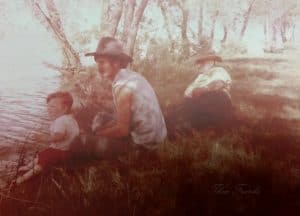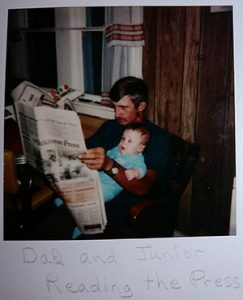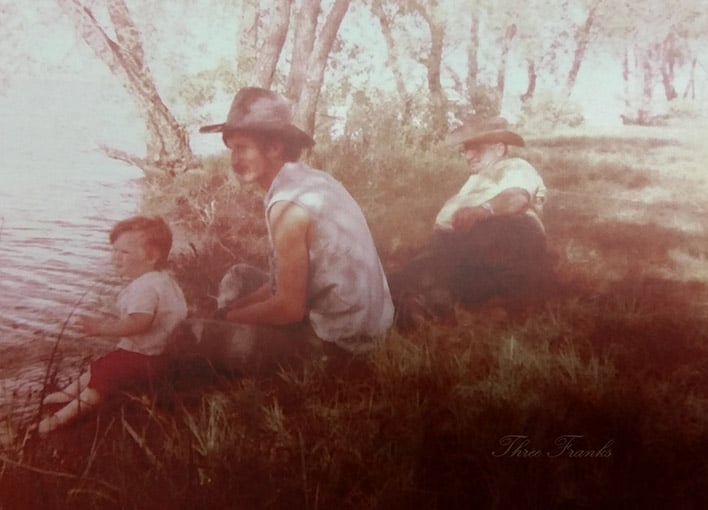I take pride in being a nonconformist, in bucking tradition to blaze my own trail. I believe it to be the hallmark of a man that he should endeavor to leave his own mark on the world. Even so, Time has a funny habit of reminding me that the apple doesn’t fall very far from the tree.
I grew up around farming. My parents and uncles farm and ranch on the same acres in southwest North Dakota that were homesteaded by my Great Grandparents after they emigrated from Czechoslovakia in the early 1900’s.
When we weren’t in school (or making a hobby out of genocide), my sisters and I spent our non-leisure time performing the usual chores to be found in plenty on a working farm: assisting the adults by tending to the chickens, pigs, calves and milk cows, maintaining the property by mowing and painting, and assisting in the shop and fields in various capacities ranging from running errands to driving trucks and tractors.
 While I loved the lifestyle, I observed first-hand how difficult it is to make a living as a farmer. Careful crop planning and management of input costs such as seed, fertilizer, fuel, and time could be nullified by Mother Nature’s whim: drought, hail storms, rains arriving too late or frosts arriving too early, grasshopper infestation, weed infestation, and numerous other maladies.
While I loved the lifestyle, I observed first-hand how difficult it is to make a living as a farmer. Careful crop planning and management of input costs such as seed, fertilizer, fuel, and time could be nullified by Mother Nature’s whim: drought, hail storms, rains arriving too late or frosts arriving too early, grasshopper infestation, weed infestation, and numerous other maladies.
The cattle side of operations had its own share of challenges. Calves could be eaten by coyotes or come down with pneumonia or hoof rot. Bulls and cows can get hit by lightning as they stand out in an open pasture during a sudden, freak storm (it happens more often than you might think).
Even if the crops reached harvest or the cattle reached maturity, the volatility of commodity markets were the final boss to conquer. No amount of good management can eliminate the forces of global commodity markets: fair weather in Ukraine may increase global supply of wheat, lowering prices. The national economy may be in recession, thus reducing families’ grocery budgets and demand for steak and hamburger.
Of course, no matter what the yield or profits may be, the bank which provided my father and uncles with operating loans would still expect payments to be made on time.
My point is: no matter how careful a farmer or rancher may be, his or her best efforts can get trumped by forces such as weather or markets, which are completely outside of his or her control.
Farming requires faith.
 When I was a teenager, I recognized that while I possessed my Dad’s entrepreneurial spirit, I did not inherit his faith. I could not fathom putting in the effort that he did, to so often see his chance at profit wiped away by a storm or eaten by insects.
When I was a teenager, I recognized that while I possessed my Dad’s entrepreneurial spirit, I did not inherit his faith. I could not fathom putting in the effort that he did, to so often see his chance at profit wiped away by a storm or eaten by insects.
So I went to university where I studied Business Management. I founded a web development firm from scratch, and I built up a respectable client base over the course of 14 years. When the oil boom arrived in our backyard, I segued into working as a contractor on a drilling rig (which is where I met RaeLea, and where we both continue to work). It’s quite a bit different from farming and ranching!
Both careers have been challenging and satisfying, but my persistent passion has always been storytelling and writing. This website was founded in part as a way to exercise (and maybe exorcise) my love of storytelling in written form.
I write in my spare time because it’s extremely difficult to earn a living as a writer. There are of course authors made famous by their breakaway best-selling novels, but they are outliers, not the norm.
As a writer, I punch at the keyboard every day. Sometimes the well runs dry and I cannot summon inspiration. Often, I write tens of thousands of words, only to grow disillusioned with the concept and set it back on the virtual shelf. I know that even when I write a story that I think may be worth sharing with others, there’s a good chance that many of my readers will find the story boring.
To succeed as a writer, I need to put in the hours, whether the concept pans out or not. I need to invest energy into studying technique and putting those ideas into practice. I have to commit to years of effort to bring a novel to life.
I must do all this, with full knowledge that my stories might never sell, might never reach break-even (and statistically speaking, probably won’t).
Despite the tribulations, despite the probability of critical and commercial failure, I still write. I have stories in my head, and they need to get out into the world.
I could not think of two trades more different from one another than farming and writing, and yet, I see now that they have a lot in common:
- They both require a long apprenticeship
- They both depend on persistent, unwavering work ethic
- The payoff for both is mostly in the hands of external forces
- Both require a certain faith (or stubbornness).
I think I may finally understand why my father persists with his fields and livestock so stubbornly every year, despite the adversaries which are stacked against him. I understand, because I feel a similar calling to tell stories, to write.
Dad could never stop planting, even if he wanted to, because farming is embedded in the composition of who he is. He has a compulsion to grow things, to make something where there previously was nothing.
Isn’t that what storytelling is? Writing is taking the seed of an idea and cultivating it until it becomes something which can reach maturity and be harvested to share with others. Maybe the readers will “buy” it, or maybe they won’t. A writer does not let such a challenge stop him.
By embracing my persistent passion for writing, I think I understand the stubbornness my younger self had labeled as the “faith” my father has. Though our interests may differ, I see now that I must have inherited that trait after all.
More stories like this: back when I was a murderer, the one you’ll wish you had not read, and taking care of your inner circle.
